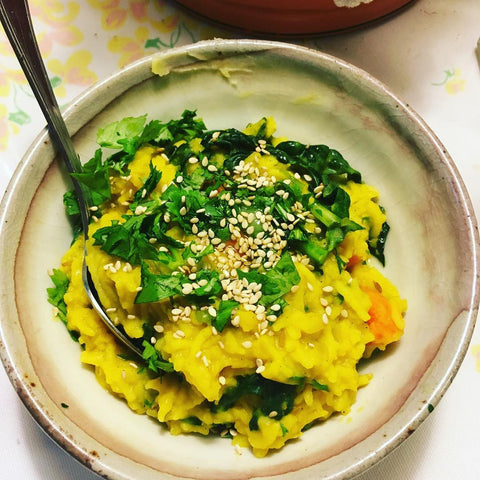Kitchari: Ayurveda's Superfood

There's nothing like a warm bowl of kitchari on a cool fall evening. Kitchari, sometimes spelled khichadi is Ayurveda's one-pot meal that is cleansing, nourishing and easy on the digestion.
Traditionally, it's made from a combination of split mung beans and aged basmati rice, mildly spiced with aromatic seeds such as cumin, coriander and fennel, and medicinal roots like turmeric and fresh ginger. Add some seasonal organic veggies to this and you have a nutritious, balanced vegetarian meal that is easy to make and oh so satisfying to eat.
Why split mung beans?
Split mung beans are said to be the easiest legume to digest and generally don't need pre-soaking unless your digestion is extra sensitive (a tendency toward gas and/or bloating). Alternately, you can use red lentils. I like to switch between the two for variety. The spit mung beans specifically have a scraping effect in the intestinal tract which helps with cleansing.
Basmati Rice
In Ayurveda, white rice is considered easier to digest and basmati rice specifically is referred to as the king of all rices. It's said to nourish all of the body tissues, and is considered sattvic, or pure, and balances all three doshas. Due to its sweet quality, it also provides a deep sense of satisfaction.
Digestive Ease
When you cook foods together in one-pot, and with spices that aid in digestion (like cumin, coriander and fennel), they get a chance to know each other better and become easier to digest! Using fresh ginger root also helps to kindle agni - the digestive fire. Cilantro, while cooling, also aids in digestion and balances the heat of the spices and helps to remove heavy metals. Turmeric is anti-inflammatory and great for joint health.
Ghee
Ghee, or clarified butter, is another Ayurvedic staple that improves digestion, feeds the good bacteria in your gut and is anti-inflammatory. It also has a penetrating effect that carries nutrients deeper into the tissues.
Whenever you're in need of a quick, nourishing meal or feel like your digestion needs a reset, kitchari is the ideal choice.
Basic Kitchari Recipe (tri-doshic)
Serves 3-4
- 1/2 cup split mung bean or red lentils
- 1/2 cup basmati rice
- 3 tsp cumin seed
- 1 1/2 tsp turmeric
- 1 1/2 tsp coriander powder (optional)
- 1 teaspoon cardamom powder (optional)
- 1 tbsp fresh ginger root, peeled and minced
- 2 carrots
- 2 cups of baby spinach or thinly sliced kale (stems removed)
- handful of fresh cilantro, chopped finely
- sesame seeds (optional topping)
- 1 lime
- ghee
Instructions
If you have a pressure cooker, this can be done in 15 minutes! If not, it will take 20-30 minutes in a regular pot.
Prep your ingredients by washing your rice and lentils in a fine metal strainer or through several changes of water in a pot until water runs clear. Measure out your spices.
- Start by heating 2 teaspoons of ghee on medium high heat in a medium pot. Add cumin seeds and heat until fragrant and slightly toasted, then add powdered spices and give a quick stir to coat evenly.
- Add the rice and split mung beans or red lentils and stir until evenly coated and rice becomes slightly translucent. Then add water — about 2.5–3 cups and cover. While letting the water come to a boil, peel and chop your ginger and carrots and add these to the pot.
- Once it comes to a boil, turn the heat to medium low and let it simmer with the pot partially covered. Once most of the water has been absorbed turn the pot all the way to low, add your spinach or kale and cover the pot letting it cook a few more minutes or until done (along the way, if you feel like it needs more water, feel free to add some extra hot water).
- When finished, add pink himalayan salt to taste, a small amount of black pepper to increase absorption of the turmeric and serve with fresh lime wedges and a little extra ghee if desired. Top with fresh cilantro and a sprinkle of sesame seeds.
Hope you enjoy this as much as I do!
Love,
Siri Radha (Danielle)
